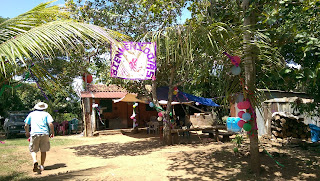Therefore I tell you, do not worry about your life, what you will eat or drink; or about your body, what you will wear. Is not life more than food, and the body more than clothes?
Matthew 6:26
Today, as we walked into the corn fields of the subsistence farmers of our partner community of Casa de Zacate we witnessed firsthand the pending disaster facing them. Winter, or the rainy season, starts around the first of May.
This corresponds to the planting season. After a promising start the rain has stopped falling. In fact, the first and only rain storm we experienced during our week long visit was around 8:00 PM tonight. Usually the landscape is lush, a verdant green.
The dusty fields are so devoid of topsoil moisture seeds are simply lying in the ground not germinating after being planted. Corn plants may only be a few inches tall instead of waist high.
In addition, the fields have been invaded by an army of worms.
These worms attack the center of the plant affecting the ability of the plant to grow.
There worms have attacked even the smallest of the plants.
In Casa de Zinc and Casa de Zacate and in other cantons and caserios there is worry about having enough to eat. The safety net is at the least in poor repair if it even exists. The farmers have used their reserve seeds in order to plant a second time. The third planting will require purchasing expensive commercial seed, the price of which will only go up if the drought continues.
They may not have a crop if the rains don't arrive soon and if the worms can not be brought under control. If there is no crop there is nothing to eat.
Many expressed how worried they were about not having anything to eat. Do not worry about your life, what you will eat or drink. This verse takes on a whole new meaning in the areas surrounding Berlin, Usulatan, El Salvador.
Questions abound. Will the rains come? Even if they come will there be enough to make a difference? Will the worm infestation be controlled? Should there be a third planting? Will it make a difference? Will there be enough to eat?
Each trip I take to El Salvador I look for the reason I am traveling. Yes, I look to renew relationships between Trinity and our partner communities. However, there is alway something else I look for.
The purpose of this trip was to be present during this time of anxiousness. To stand beside our brothers and sisters is to reassure them they are not alone. While we can not make it rain and while we can not eradicate the worms we can offer our prayers, our thoughts, and potentially our help if the situation worsens.
As we closed our visit we came together as one community. Complete with a band our Trinity delegation along with members of the mission team and members of Casa de Zinc and Casa de Zacate partied. With dancing, soccer, refreshments, gifts for the children, pinatas, all the worry was set aside for a couple of hours.
As the laughter wound itself within the strains of the music, as the smiles appeared on the faces of those watching the children, I was reminded of the great faith exhibited by our Salvadoran brothers and sisters. Somehow, someway God will provide.
Maurice



















































